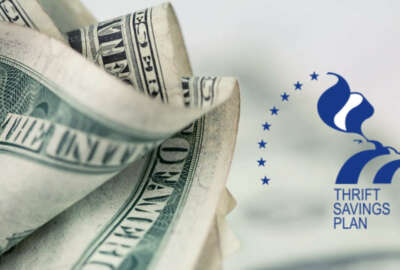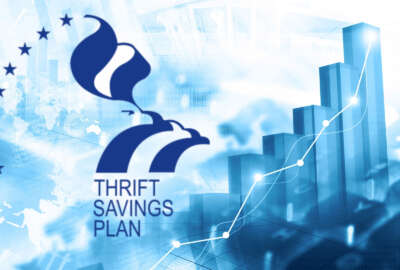I know you’re busy, but don’t overlook end-of-year financial planning
'Tis the season to be jolly. But don't get too distracted from important priorities, like end-of-year financial planning. For some orientation, the Federal Drive...
‘Tis the season to be jolly. But don’t get too distracted from important priorities, like end-of-year financial planning. For some orientation, the Federal Drive with Tom Temin spoke with Thiago Glieger, a wealth adviser with RMG Advisers of Rockville, Maryland, a firm that specializes in federal employees.
Interview Transcript
Thiago Glieger There’s so much that people can be doing between now and the end of the year. And one of the big ones that we see around this time of the year is getting ready for capital gain distributions. If you own a mutual fund investment inside an account, that is non retirement. So this is like an individual account or joint account. And this is something you’re going to want to be watching for because every year, right around this time of the year, mutual fund companies are going to pass on those capital gains distributions to you as the investor. This happens because other investors throughout the year are selling their funds. They’re redeeming shares. So the capital gains get realized throughout the year for that mutual fund. And here’s the thing that people miss is even if you don’t sell that mutual fund, you’re still going to owe the taxes on that money. And so that happened big time last year where people were losing money because the markets were down and they still owe taxes. So that’s a big thing that’s going to come up to them next time they have to pay taxes in the coming year.
Tom Temin That would not include funds in your TSP.
Thiago Glieger Correct. That’s the good thing about tax deferred accounts, like a retirement account, is you don’t have to worry about those distributions because the only time you’re taxed then is if money comes out of the account. So unless you took money out of the TSP, no taxes to worry about.
Tom Temin On the other hand, if you have a Roth, what happens?
Thiago Glieger And that’s the good thing about the Roth, too, is the Roth there’s no taxes. So that’s one of the big benefits is you get to touch that money, pull it out of the account without having to worry about taxes at all. As you know, the higher your tax bracket goes, the more that impacts a federal pension if you have that Social Security, taxes, capital gains, all kinds of things get impacted by that.
Tom Temin And what about required minimum distributions, either of your own TSP if you are retired and you haven’t done that in the year, I mean, is there a timing issue there? And what about an inherited IRA? Some people, as they get along and still working, may have those in their bank, too.
Thiago Glieger That’s right. Yeah. The [Required minimum distributions (RMDs)] is everybody’s least favorite topic at the end of the year because they’re thinking about this huge tax bill that’s going to come down. And so minimum amount of money has to come out of your retirement account if it’s pretax, because it’s money that’s got to grow with no taxes yet. So you owe the taxes on the money and you have to think about where is this money going to come from? Are you going to use this as a time to rebalance your portfolio, because you have to make some sales to generate the cash? Do you want to just use cash you already have on hand? Maybe your other investments are down and you don’t want to sell them at a loss. You may also want to be considering taking more than your minimum amount. And this is the case if you’re thinking down the line, you might be in a higher tax bracket than you are today simply because your minimum distribution will be bigger or because tax rates might be going up here in a couple of years if the tax laws don’t change. So maybe you take a bigger chunk out here at the end of the year, this year, while you’re still in a lower bracket. That’s something that’s been really popular for feds.
Tom Temin Many feds, when they do retire, are not ready to stop working. And if you’re at a certain level coming out of the federal government, you’ve got lots of offers from industry and a lot of feds take them. Oh, why don’t you go there? Ok. And so you have this full time income coming in, but you might actually be at the RMD age, which I guess is up to 71.5 now. And so how do you figure out all of that when you’re working and you’re retired, so to speak, for purposes of your annuity and your TSP withdrawals?
Thiago Glieger Yeah. The challenge in working in retirement is if you have the annuity already, that’s fully taxable. If you are of RMD age, that money is fully taxable, so you keep stacking more and more money on top. So thinking about where your tax rates might be in the future, if we have the Tax Cuts and Jobs Act sunsetting here in 2026, which is how the current law is set, set to sunset, unless they make changes, tax rates are going to bump. And so you might be thinking, ok, if that’s going to happen and I plan to continue working through those years, I’m immediately going to pay 3%, 4% more taxes than I am right now. So maybe I take bigger distributions out of my retirement accounts while I’m still on a lower bracket.
Tom Temin And what about gifts that can offset taxes? This is the time of year when people think about that, too. So maybe instead of that car, you could get a lesser car and give charitable contributions to offset taxes.
Thiago Glieger Yeah, that’s a really big one, Tom, because if you are of a certain age and the key age here is 70.5, you can do something called a qualified charitable distribution or known as a QCD. Now it works nicely with an RMD, which, by the way, used to be 70.5. As you said, it has gone up, went up to 72, then 73 to 75, depends on when you were born. But the key here is that it allows somebody that’s 70.5 or older to take a distribution from their retirement accounts, send it directly to the charity. And you don’t owe taxes on that money because it went to a charitable organization. The charity doesn’t owe money. But you also get to satisfy your RMD and you think of the other way of making a charitable donation. If you’re going to cut a check and just write it to a charity, you’ve paid taxes on that money already. And if you’re itemizing, you probably had no tax benefit of just writing that check. So if you can do it out of a retirement account, do a QCD. That can be extremely beneficial because everybody gets to save on taxes and you get to do some good in the world.
Tom Temin And what about fixed income annuities? These are available from your alma mater and some ways. So they get your money now and then they give you this percentage on that money, almost like a CD type of arrangement, and you can get them from financial institutions. Good idea. And this year end a good time to enter into one of those.
Thiago Glieger I think the end of the year is always a good time to be thinking about your strategy for next year. One thing that we encourage feds as they think about these kinds of annuities is whether they want to trade the liquidity of their capital for another type of pension, because an annuity is sort of like a pension. We have Social Security that they’ve paid into. We have their first pension that they’ve paid into, and some people really like that guaranteed stream of income that guaranteed 3 or 4%, whatever the annuity is offering. But that requires them exchanging a chunk of their liquid assets for that annuity. But if that can help give you peace of mind, then that’s something that should be contextualized within their retirement plan and can be very helpful.
Tom Temin Right. And they come in different sizes. So you can kind of decide how much tolerance you have for setting that part of your TSP aside. That’s where you would take it from. And there’s probably tax implications there too, right?
Thiago Glieger Annuities have their own kinds of taxations. If you are moving it from a tax preferred vehicle to another tax preferred vehicle, you do get to maintain that tax preference. But you do have to be careful because if you take the money out, it’s considered a distribution and then you put it back in there can be taxes on that transition.
Tom Temin And also on the topic of IRAs, you can make children’s contributions at this point. For how? How does that work?
Thiago Glieger That’s a really popular one, Tom, because if you have a child that took a summer job, maybe they were at the pool or whatever it is, as much as they earn, they can contribute that to an IRA account for themselves as well. Now, kids, most of the time they’re going to want to keep that money. They’re going to use it for pizza or for school or something like that, hanging out with their friends. So parents and grandparents can make that contribution up to $6,500 as long as they earn that for 2023. And some of our clients will do these annual IRA contributions for their kids, for their grandkids, even into their 20s. And that’s a really nice way to help the kids begin to think about saving and investing for themselves. We almost always suggest a Roth for them because they’re in a low tax bracket. They’re not earning a lot of money. If you do it right, by the time they’re 30, they could be sitting on potentially six figures of tax free money. That can just put them so much further in life by having that there.
Tom Temin Sure, and don’t buy a car with it either and keep it for the next 30 years and then you’ll really be happy. And what about Roth conversion? We should probably review the pros and cons of that at this point.
Thiago Glieger Yeah. At the end of the year, you can decide whether or not you want to fill the rest of your tax bracket by taking some money out of pretax accounts like the traditional TSP, traditional IRA, and converting it to a Roth. You pay the taxes by doing that, so you’re filling your tax bracket. But again, it’s that age old question. What tax bracket are you projected to be in the future? If maybe this wasn’t a year that you had tons of income, maybe it was a first year of retirement, you may consider filling up your bracket to whatever level until you hit that next percentage bracket. Take the taxes at a slightly lower rate. If you think you’re going to be paying more in the future because you’re earning more, you have RMDs that will cause that, or the tax laws might change.
Tom Temin And if you do any of these things we’ve been discussing, moving around funds, adding, subtracting, they all have tax implications. Does the online tax system that people are using to have those rules and those requirements built into them such that you just fill in the numbers and your tax will be calculated accurately?
Thiago Glieger Yes or no? I think TurboTax and a lot of those systems have come a really long way and they do a really nice job for what they offer. But I think that if you input the information incorrectly, if you use the wrong form for whatever reason, you could cause some challenges. We always ask people to double check with an accountant, of course they are the tax professionals. Because sometimes it’s not just about getting the number right, it’s the planning of whether you should even do it in the first place. So if they have financial planners, if they have accountants, those are good people to bounce these ideas off before you do something. And then you have to go back and undo it.
Tom Temin And you could jump into Santa’s lap at the mall. Do they still have malls with Santas? I don’t even know, and ask for a new tax code. Ten pages long or five pages long. That would really be a contribution to the advancement of humanity. But it’s not going to happen. And finally, there’s the question that comes up periodically, especially this time of year. Do you move your funds out of the TSP because you’re annoyed at their cost ratios are rising for the TSP. I guess they’re still pretty good relative to industry. And what’s your thinking on to stay in the TSP or maybe try that fidelity type of thing?
Thiago Glieger Yeah, I think if you’re still working and you’re contributing to the TSP, you belong in the TSP, you should be maximizing every last dollar that you can into those contributions. Once you retire, you can think about whether or not that vehicle is meeting your needs. How many times do you need to take distributions throughout the year? How frequently do you need those? The TSP has limitations in how the money comes out, and so you compare that with what are your other options? And when we talk to clients about meeting their needs, it’s really determining what is your plan going to require for you to meet your objectives? And then what are the best tools available for you? Every one of these custodians and different options has pros and cons to them. You just have to find the one that works best for you.
Tom Temin And maybe we should end this by saying, yes, the gift season is coming on, but it’s basic. Don’t run up your credit cards to give nice gifts. If you can’t afford it with cash, then skip it.
Thiago Glieger Agreed. Having to then take money out and pay taxes on it to pay off a credit card bill doesn’t make a whole lot of sense.
Copyright © 2025 Federal News Network. All rights reserved. This website is not intended for users located within the European Economic Area.
Tom Temin is host of the Federal Drive and has been providing insight on federal technology and management issues for more than 30 years.
Follow @tteminWFED






